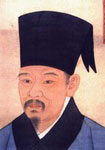《中秋月望十六终夜如昼》 苏辙
云生未望夜,天借极圆时。
冷澈登临倦,衰慵起舞迟。
兔闲长捣药,桂老尚生枝。
运转何年住,清明与物宜。
油然任消长,斤斧定何施。
作者简介(苏辙)

苏辙(1039—1112年),字子由,汉族,眉州眉山(今属四川)人。嘉祐二年(1057)与其兄苏轼同登进士科。神宗朝,为制置三司条例司属官。因反对王安石变法,出为河南推官。哲宗时,召为秘书省校书郎。元祐元年为右司谏,历官御史中丞、尚书右丞、门下侍郎因事忤哲宗及元丰诸臣,出知汝州,贬筠州、再谪雷州安置,移循州。徽宗立,徙永州、岳州复太中大夫,又降居许州,致仕。自号颍滨遗老。卒,谥文定。唐宋八大家之一,与父洵、兄轼齐名,合称三苏。
《中秋月望十六终夜如昼》苏辙 翻译、赏析和诗意
《中秋月望十六终夜如昼》是苏辙所写的一首诗词。以下是对该诗词的中文译文、诗意和赏析:
中秋月望十六终夜如昼,
On the sixteenth night of the Mid-Autumn Festival, the moon shines all night as bright as day.
朝代:宋代,作者:苏辙。
秋气久已到,月明如可期。
Autumn has long arrived, and the moon's brightness is anticipated.
这里描绘了秋天的气息已经弥漫,人们期待着月亮的出现。
云生未望夜,天借极圆时。
Clouds conceal the night, awaiting the perfect moment for the sky to borrow the utmost roundness.
云层遮挡了夜晚的景象,等待着天空借用最圆的时刻。
冷澈登临倦,衰慵起舞迟。
Feeling cold and clear, I climb to the top wearily, reluctant to dance at this late hour.
作者感到寒冷而清爽,他疲倦地登上高处,不愿意在这个深夜时刻起舞。
兔闲长捣药,桂老尚生枝。
The idle rabbit pounds medicine, while the aged cassia tree still sprouts branches.
这里以寓意的方式描绘了兔子捣药和桂树生长的情景,表达了岁月的流转和生命的延续。
运转何年住,清明与物宜。
How many years will the cycle continue? It is appropriate for clarity and harmony with all things.
诗人思考着岁月的运转,探讨生命的意义和与世界的和谐。
油然任消长,斤斧定何施。
Naturally, things wax and wane; what use is there for an axe?
万物都会自然地生长和消亡,斧头又有何用呢?
这首诗词通过描绘中秋夜晚的景象,展现了作者对秋天和月亮的感受,同时表达了对自然界和人生的思考。通过描写秋天的气息、月亮的出现、云层的消散、作者的倦意和思考,以及生命的延续和岁月的流转,诗词呈现出一种恬静、深沉的意境。诗人以简洁而凝练的语言表达出对自然、生命和人生的思考,引发读者对于时间流转、生命的意义以及与自然的关系等主题的思考。
《中秋月望十六终夜如昼》苏辙 拼音读音
zhōng qiū yuè wàng shí liù zhōng yè rú zhòu
中秋月望十六终夜如昼
qiū qì jiǔ yǐ dào, yuè míng rú kě qī.
秋气久已到,月明如可期。
yún shēng wèi wàng yè, tiān jiè jí yuán shí.
云生未望夜,天借极圆时。
lěng chè dēng lín juàn, shuāi yōng qǐ wǔ chí.
冷澈登临倦,衰慵起舞迟。
tù xián zhǎng dǎo yào, guì lǎo shàng shēng zhī.
兔闲长捣药,桂老尚生枝。
yùn zhuàn hé nián zhù, qīng míng yǔ wù yí.
运转何年住,清明与物宜。
yóu rán rèn xiāo zhǎng, jīn fǔ dìng hé shī.
油然任消长,斤斧定何施。
网友评析
- 《峡中行》 雍陶
- 《韦处士郊居》 雍陶
- 《太真香囊子》 张祜
- 《听筝(一作题宋州田大夫家乐丘家筝)》 张祜
- 《马嵬归》 张祜
- 《塞上闻笛(一作董家笛)》 张祜
- 《杨花》 张祜
- 《孟才人叹》 张祜
- 《听岳州徐员外弹琴》 张祜
- 《胡渭州》 张祜
- 《秦原道中》 欧阳衮
- 《听郢客歌阳春白雪》 欧阳衮
- 《前山》 裴夷直
- 《八月十五日夜》 裴夷直
- 《崇山郡》 裴夷直
- 《临水》 裴夷直
- 《送盛长史(盛随军)》 朱庆馀
- 《宿道士观》 朱庆馀
- 《公子行》 朱庆馀
- 《与贾岛、顾非熊、无可上人宿万年姚少府宅》 朱庆馀
- 《震为苍筤竹》 朱庆馀
- 《题青龙寺》 朱庆馀
- 《送杨秀才游蜀》 张祜
- 《题赠志凝上人》 张祜
- 《题王右丞山水障二首》 张祜